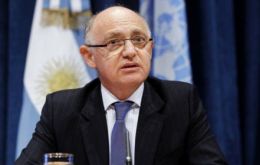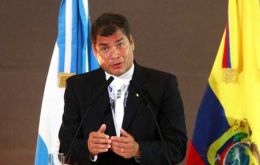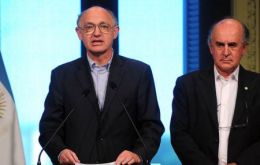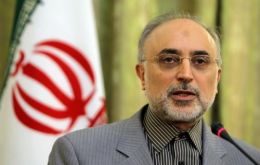MercoPress. South Atlantic News Agency
Tag: Iran
-
Thursday, December 27th 2012 - 05:39 UTC
Timerman meets with Jewish community to report on talks with Iran

Argentine Foreign Minister Hector Timerman met with the relatives of victims of the Buenos Aires 1994 AMIA Jewish center bombing to update them on negotiations with Iran. The update came three months after Timerman's first public meeting with his Iranian counterpart.
-
Monday, December 10th 2012 - 23:02 UTC
Jewish community protests for being kept on the dark on Argentina/Iran negotiations

The head of the Argentine-Jewish Community Centre (AMIA), Guillermo Borger, warned the government of President Cristina Fernandez that the organization’s members are concerned by the lack of information regarding ongoing negotiations with Iran over the 1994 terrorist attack on the AMIA headquarters, which killed 85 people.
-
Friday, December 7th 2012 - 01:41 UTC
Standard Chartered ready to settle with US regulators for making business with Iran

Standard Chartered expects to pay 330 million dollars to US regulators to settle claims that it did not comply with US sanctions against Iran. The amount is on top of 340m it paid to New York's Department of Financial Services (DFS) earlier this year.
-
Wednesday, December 5th 2012 - 05:15 UTC
Correa defends close links with Iran and downplays the AMIA bombing in Buenos Aires

Ecuadorean president Rafael Correa triggered a serious controversy in Argentina when he defended close links with Iran and downplayed Teheran’s alleged role in the 1994 attack on the AMIA Jewish institution in Buenos Aires that killed 85 people and left hundreds injured.
-
Monday, December 3rd 2012 - 05:15 UTC
Argentina confirms new round of talks with Iran in January

Argentine Foreign Minister Héctor Timerman confirmed this weekend that there had been new meetings with envoys of the Iranian government over the probe handling the AMIA bombing, and assured that Argentina will present a new action plan in the coming few weeks, most probably in the next meeting scheduled for January.
-
Wednesday, October 31st 2012 - 20:22 UTC
Iran/Argentina dialogue ‘positive’ and will continue end of November, says Timerman

Foreign Minister Héctor Timerman announced at Government House in Buenos Aires that new negotiations between diplomatic representatives of Argentina and Iran over the investigation into the 1994 AMIA terrorist attack, will take place before the end of November.
-
Wednesday, October 31st 2012 - 04:51 UTC
Argentine-Iran dialogue is ‘over’, says Jewish community rejecting Teheran’s denial of any involvement

The president of the Argentine Jewish Community centre, AMIA, Guillermo Borger said that if Iran insists in rejecting any links with the 1994 attack in which 85 people were killed and 300 injured, the current dialogue between Argentina and Teheran on the issue “is over”.
-
Wednesday, October 31st 2012 - 03:54 UTC
Iran insists in denying any involvement in deadly attack on Jewish centre in Buenos Aires

Iran’s government rejected once more the involvement of any Iranian citizen in the 1994 AMIA Jewish Centre terrorist bombing, but indicated to be ready to help into identifying those who could have committed the attack.
-
Wednesday, October 31st 2012 - 02:38 UTC
Iran expected to import 100.000 tons of Argentine soy-oil in 4Q

Iran is likely to import over 100.000 tons of soy-oil from Argentina in October-December 2012 as Iran's purchasing of soy beans, soy-oil and soy-meal is recovering from the impact of sanctions, Hamburg-based oilseeds analysts Oil World said on Tuesday.
-
Tuesday, October 2nd 2012 - 23:17 UTC
Argentina becomes main supplier of soy and soy-oil to Iran in third quarter

Iran made major imports of Argentine soy-oil and soybeans between July and September as Iranian buyers found methods of making payments in the face of western sanctions, Hamburg-based oilseeds analysts Oil World said on Tuesday.
